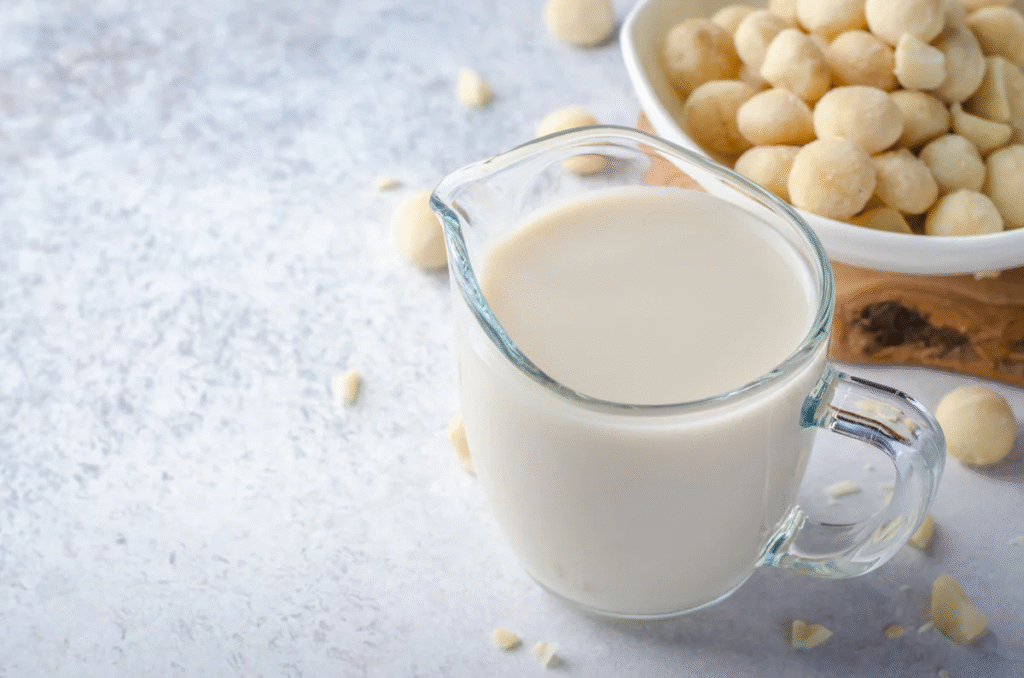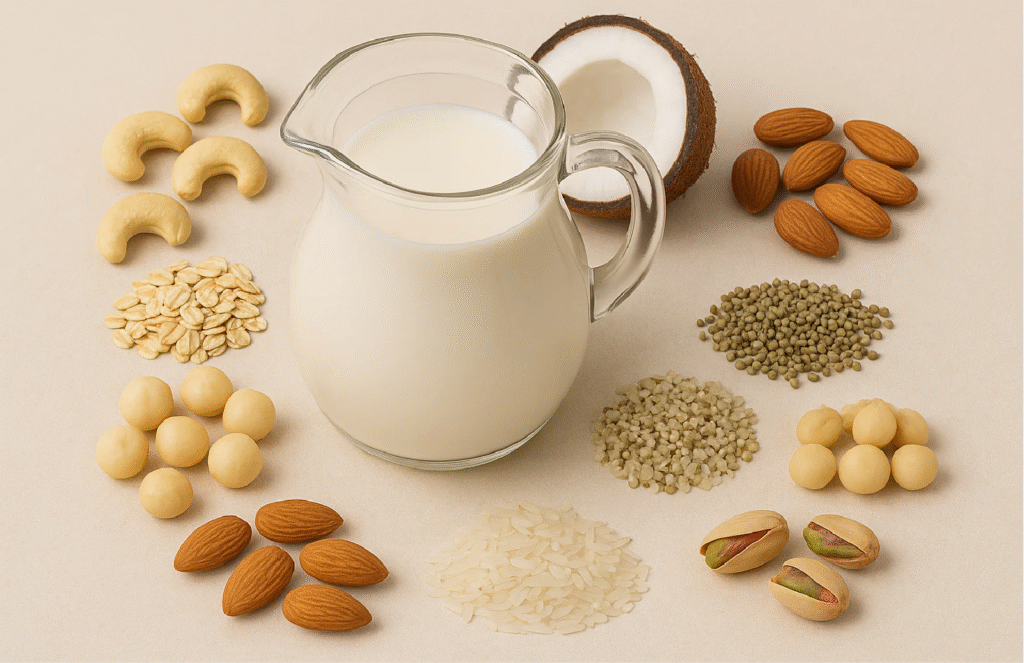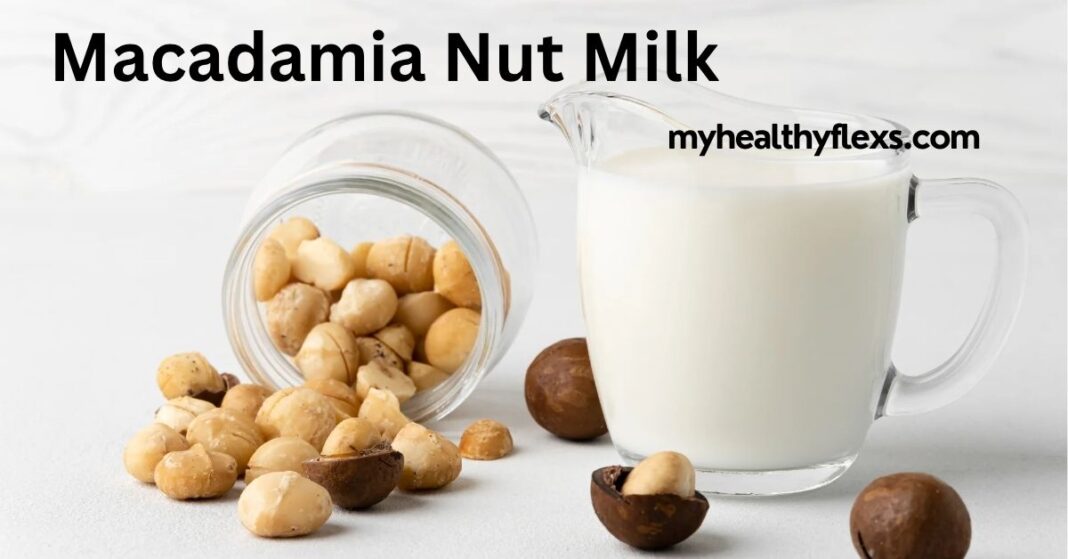As plant-based diets gain popularity, macadamia nut milk has emerged as a top contender in the world of dairy alternatives. With its creamy texture, rich flavor, and nutritional benefits, it is quickly becoming a favorite among those looking for a non-dairy milk option. Whether you’re lactose intolerant, vegan, or simply exploring healthier options, macadamia nut milk offers a versatile choice for your daily diet.
What Is Macadamia Nut Milk?
Macadamia nut milk is a dairy-free alternative to traditional cow’s milk. It is made by blending soaked macadamia nuts with water, creating a smooth and creamy beverage. Similar to other plant-based milks like almond or oat milk, it serves as a substitute in coffee, smoothies, baking, and cooking. Its subtle, buttery flavor and smooth texture make it a perfect addition to a wide variety of recipes.

Nutritional Benefits of Macadamia Nut Milk
Macadamia nut milk boasts a range of nutritional benefits that make it stand out among other dairy-free alternatives.
1. Rich in Healthy Fats
Macadamia nuts are known for their high content of monounsaturated fats, particularly oleic acid, which has been shown to help reduce bad cholesterol and improve heart health. These heart-healthy fats contribute to the creamy texture of the milk, making it a great option for those seeking a richer, smoother alternative to other nut milks.
Also Read: Hentquz: The Future of Productivity and Collaboration
2. Low in Carbohydrates
One of the key advantages of macadamia nut milk is its low carbohydrate content. It is an excellent choice for those following low-carb or ketogenic diets, providing a filling beverage without the added sugars found in many other milk alternatives.
3. Packed with Essential Nutrients
Macadamia nut milk contains important vitamins and minerals, including thiamine, manganese, and magnesium. These nutrients support energy production, bone health, and overall well-being. The high vitamin E content in macadamia nuts also acts as an antioxidant, helping to protect the body from oxidative stress.
4. Gluten-Free and Dairy-Free
Macadamia nut milk is naturally gluten-free and lactose-free, making it suitable for individuals with gluten intolerance or dairy allergies. It also offers a hypoallergenic alternative to milk for those who cannot tolerate soy or almond-based beverages.

How to Make Macadamia Nut Milk at Home
Making macadamia nut milk at home is quick and easy. All you need are raw macadamia nuts, water, and a blender.
Ingredients:
- 1 cup of raw macadamia nuts
- 4 cups of filtered water
- Optional: sweetener (like dates or maple syrup), vanilla extract, or a pinch of salt
Instructions:
- Soak the Nuts: Soak the macadamia nuts in water for 1-2 hours to soften them. This helps create a smoother texture.
- Blend: After soaking, drain and rinse the nuts. Place them in a blender with 4 cups of fresh water and blend until smooth.
- Strain (Optional): If you prefer a smoother milk, strain the mixture through a nut milk bag or fine mesh sieve to remove the pulp.
- Flavor (Optional): Add sweetener, vanilla extract, or a pinch of salt to taste and blend again to combine.
- Store: Store the macadamia nut milk in a sealed container in the refrigerator. It should stay fresh for up to 4-5 days.
Making your own macadamia nut milk at home ensures that you avoid additives and preservatives, and you can tailor the flavor to suit your preferences.
Also Read: Pantagonar: A Comprehensive Guide to Its Benefits for Hair Loss
Macadamia Nut Milk vs. Other Nut Milks
When compared to other plant-based milks like almond and cashew, macadamia nut milk has distinct advantages.
Creaminess
Macadamia nut milk has a naturally rich and creamy texture due to its higher fat content. This makes it an ideal substitute for those who miss the creaminess of cow’s milk in their beverages or dishes.
Nutritional Profile
While almond milk is popular for being low in calories, macadamia nut milk is higher in healthy fats and lower in carbohydrates. It also provides a better balance of vitamins and minerals, making it a more nutrient-dense option for daily consumption.
Flavor
Macadamia nut milk has a subtle, buttery flavor that pairs well with both sweet and savory dishes. This versatility makes it a perfect base for smoothies, coffee, and even cooking, unlike almond milk, which can sometimes have a more pronounced nutty flavor.

Environmental Considerations
Like all plant-based milks, macadamia nut milk has a lower environmental impact than cow’s milk, but it’s important to consider the ecological footprint of its production.
Also Read: Corpenpelloz: The Intersection of Identity, Technology, and Creativity in the Digital Age
Water Usage
Macadamia trees require a significant amount of water, which can contribute to environmental concerns, especially in areas facing water scarcity. However, the water usage of macadamia nut trees is typically lower than that of dairy cows, making it a more sustainable option overall.
Land Use
The cultivation of macadamia nuts does require a fair amount of land, which could lead to deforestation and habitat disruption if not managed sustainably. Choosing brands that source their macadamia nuts from sustainable farms can help mitigate some of these concerns.
Sustainability
Many macadamia nut milk brands are taking steps to ensure their production processes are sustainable, including eco-friendly packaging and ethically sourced nuts. When purchasing, look for brands that prioritize sustainability to reduce your environmental footprint.
Frequently Asked Questions (FAQs)
Is macadamia nut milk suitable for individuals with nut allergies?
No, macadamia nut milk is not safe for individuals with tree nut allergies. If you have a nut allergy, it’s important to avoid this milk and look for other dairy alternatives like oat or rice milk.
Can macadamia nut milk be used in cooking and baking?
Yes, macadamia nut milk is a versatile ingredient that can replace cow’s milk in most recipes, including soups, sauces, baked goods, and more. Its rich texture enhances the flavor of both sweet and savory dishes.
Does macadamia nut milk contain added sugars?
It depends on the brand. Some commercial macadamia nut milks contain added sugars or sweeteners to enhance flavor. If you’re concerned about sugar content, opt for unsweetened varieties.
How should macadamia nut milk be stored?
Homemade macadamia nut milk should be stored in an airtight container in the refrigerator and used within 4-5 days. Commercial versions may have a longer shelf life, but always check the label for specific storage instructions.
Is macadamia nut milk keto-friendly?
Yes, macadamia nut milk is keto-friendly due to its low carbohydrate content. It’s a great option for those following a ketogenic or low-carb diet.
Conclusion
Macadamia nut milk is a delicious and nutritious alternative to cow’s milk that offers a rich, creamy texture and a host of health benefits. It’s an excellent option for anyone looking to reduce dairy intake, and it serves as a versatile ingredient in a variety of dishes. While it’s important to consider environmental factors, macadamia nut milk’s health benefits and creamy consistency make it a popular choice among plant-based milk alternatives.
By making macadamia nut milk at home or choosing a sustainably sourced brand, you can enjoy this creamy beverage guilt-free and add a nutritious twist to your daily routine.


